
Though they may have more differences than similarities, they posed a united front against their common enemy – Mohamed Morsi.
On Thursday, Egypt's Constitutional Court President Adli Mansour was sworn in as Egypt's interim head of state, but his achievement will be shared by several figures who became prominent critics of the ousted president in the past year.
Related stories:
- Egypt: Interim president sworn in; Morsi held by army
- Syria's Assad declares fall of 'political Islam'
- Obama orders US to review aid to Egypt
Founder of the young protest movement, leader of the Islamist party and a former presidential candidate attempting a comeback – these are some of Egypt's newest leaders:
Adli Mansour
Egypt's judiciary, which has been at loggerheads with Morsi on many occasions during his short term, has the most to gain from his ouster – with Adli Mansour as the direct beneficiary.
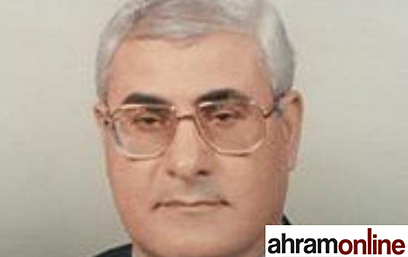
Adli Mansour
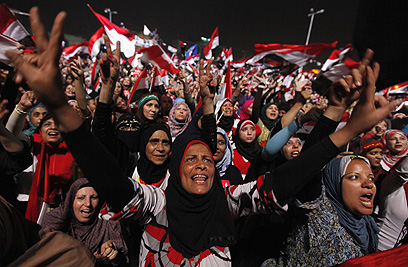
Masses celebrating Morsi ouster (Photo: Reuters)
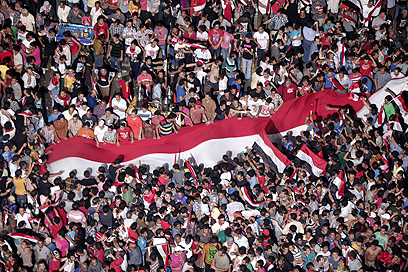
(Photo: EPA)
Mansour, who was appointed president of the Constitutional Court only last Monday, is considered by the Egyptian media as a "mysterious figure," and few of his photographs can be found online.
However, it's clear he is a committed technocrat, and is hailed by colleagues as a "first rate jurist."
Mansour, 68, spent most of life pursuing a career in law, and his term as judge is one of the longest in Egypt's history. He finished his studies in Cairo University and was admitted into the bar in 1967.
After slowly moving up the ranks, in 1992 he was appointed deputy chairman of the State Committee, one of Egypt's judicial branch's three bodies.
That same year he was also appointed as deputy president of the Constitutional Court.
Generally, it seems Mansour's star shone during deposed President Hosni Mubarak's reign.
In May 19, 2012 the Constitutional Court's general assembly decided to appoint Mansour as president of the Court, replacing Judge Maher al-Bahiri, who retired on June 30. His election was a precedent, since in the last 22 years no constitutional court's president served as one of the institution's judges.
As noted, Mansour only officially started this role when a new title was hoisted on him – that of Egypt's interim head of state.
It should be noted that Mansour is the second to hold the title, after Sufi abu-Taleb, who served at the same role after the assassination of President Anwar Sadat in 1981.
Mohamed Bader
Another figure who can rest on his laurels after Wednesday's events the founder of the Tamarod ("rebellion") movement, which ran the campaign for Morsi's ouster – sometimes with the aid of creative measures.
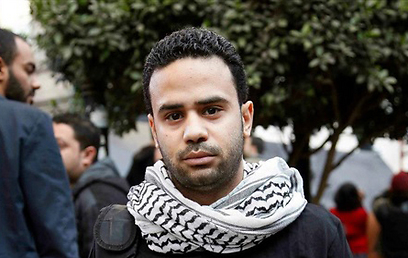
Mohamed Bader
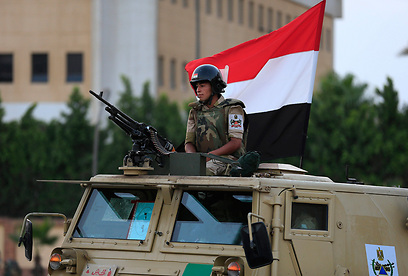
Army in Cairo streets (Photo: AP)
Mohamed Bader is a well-known activist for the opposition, starting in the Mubarak period when he worked for the Kafaya ("enough") opposition movement, which also objected to any normalization of relations with Israel.
He later became a member of the political coalition of the Youth of the Revolution, which actively participated in the January 25 revolution which deposed Mubarak, and was dismantled after the presidential elections.
Bader represents a significant portion of young Egyptians who feel that the Muslim Brotherhood movement has robbed them of the revolution, and have now returned to center stage.
Younes Makhioun
A perhaps surprising winner, affiliated as he is with the Islamist camp, is the leader of the Salafi Al-Nour party, which came in second after the Muslim Brotherhood in the 2012 parliamentary elections.
Makhioun, a trained dentist from the city of Abu-Homs to the west of the Nile delta, was also active in the January 25 revolution. In 2012 he served as a lawmaker, and when Al-Nour's last chairman, Imad a-Din Abd a-Rafur, left the party's ranks last January – Makhioun stepped in.
Over recent months the Al-Nour party quarreled with the Muslim Brotherhood, especially over Morsi's policies, and Makhioun joined the opposition's calls for early presidential elections when the army presented Morsi with the 48 hour ultimatum on Monday.
On Wednesday, he and his party found themselves on the winning side, and they now have the opportunity to rebrand themselves as the alternative to the maligned Muslim Brotherhood.
Mohamed ElBaradei
Morsi's ouster also benefits the opposition's leader and previous contender for the presidency. Mohamed ElBaradei, Nobel Peace Prize laureate and former head of the International Atomic Energy Agency (IAAE), returned to Egypt in February 2010, after a long residency in Austria and the United States, and took an active part in the wide-scale unrest which lead to Mubarak's ouster.
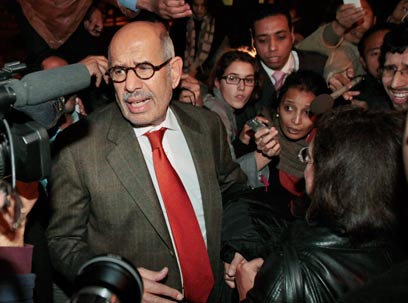
Mohamed el-Baradei (Photo: AP)
Following the revolution he was an outspoken critic of the Muslim Brotherhood, and on April 2012 he formed a new party, through which he intended to unite the Egyptian people and preserve the revolution's achievements .
So far, ElBaradei stood at the helm of the opposition to Morsi, and slammed many of the latter's contested moves. After the ouster, he announced that the roadmap formed with the army for a transition of power will correct the faults which resulted from the previous revolution.
"The roadmap supplies the Egyptian people's basic and true demand which is presidential elections," he said, adding: "During the interim, the constitution will be mended and a national reconciliation will take place."
Abdel Fattah al-Sisi
The man most recognized with Wednesday's revolution is the one who presented Morsi with the ultimatum, and later won the honor of declaring his ouster. Al-Sisi, 58, was appointed as the army chief of staff and defense minister in August 2012, while his detractors' claimed that he is linked to the Muslim Brotherhood.

Al-Sisi announcing ouster
When appointed, al-Sisi was the youngest of the High Military Council, and compared to his colleagues he avoided the press, maintaining relative anonymity. He was mostly known after the revolution which ousted Mubarak due to his determined objection to the violent treatment of protestors and detainees.
But Wednesday evening he was crowned a hero by the masses after announcing on the Egyptian state TV channel that "Morsi is no longer president."
Hearing the news, in Cairo's Tahrir Square the crowds rejoiced, and many drivers honked their horns in support of the chief of staff.
"Come to us, Sisi, Morsi isn't our president," the protesters calls. The chief of staff returned their love in the form of army helicopters which hovered over the Cairo sky, hanged with the republic's flag – as befitting the second revolution new face.
- Receive Ynetnews updates
directly to your desktop















